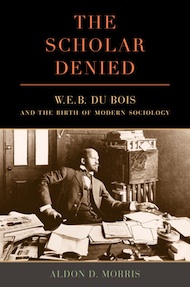By Kayleigh Whitman
In his revealing text The Scholar Denied: W.E.B Du Bois and the Birth of Modern Sociology, Alton D. Morris calls attention to the integral role that Du Bois played in the early history of sociology. Morris explains that he aims to bring light to the “intriguing, well-kept secret regarding the founding of scientific sociology in America… [it] was founded by a black professor located in a historically black university in the South.” Equally interesting is Morris’ demonstration of how many of Du Bois’ beliefs about the subject’s practice endured and influenced the field despite the overt racism that plagued America and academia during the first half of the twentieth century.
To begin, Morris addresses the misunderstanding that Du Bois built no theoretical system used in sociological study. Du Bois almost prophetically predicted that the color line would be the decisive issue of the twentieth century. He was also one of a small group of scholars who believed race was not an indication of one’s intellectual or social abilities. Instead, Du Bois argued that race was a social construct and the Social Darwinist approach utilized by most social scientists was in fact a way for them to legitimize their own prejudices. Morris reminds the reader that Du Bois’ was a radical stance during the early twentieth century and subsequently shows what it cost him. Du Bois was denied jobs, received significantly less funds than other leading researchers of the time while he was at Atlanta, and was denied opportunities to speak at academic conferences. Considering the infamy of Booker T. Washington, these instances cannot be attributed solely to Du Bois’ race. As Morris asserts, these were a result of Du Bois pushing back against the “work for respectability” approach endorsed by Washington.
The role of politics in this story is most relevant in the tensions between Du Bois and Washington. Morris shows how the majority of academics’ adulation of Washington’s ideas impacted the ability of Du Bois to gain legitimacy as a sociologist. In chapter four Morris explains how sociologist Robert Ezra Park and Washington together helped lead a campaign against Du Bois and attempted to discredit his beliefs in the academic community. In order for Washington to remain the leading African American scholar and to wield any political power, Du Bois’ science had to be delegitimized. Since Washington already had the ear of the public, this was not a difficult feat to accomplish. Combined with the scarce resources already afforded blacks during this time, the political momentum fueled by Washington marginalized Du Bois and his sociological work.
Perhaps the most interesting segment of the text is Morris’ suggestion that despite prejudice, Du Bois implemented the first working model for empirically based sociological research. Morris argues in his first chapter that instead of resting on the accepted understanding of “racial science”- primarily that African Americans were inherently inferior to their white counter parts because of their race- Du Bois sought answers about racial inequality in the field. The Scholar Denied gives special attention to The Philadelphia Negro, which examined the experience of southern blacks that relocated to Philadelphia during the early twentieth century. Morris writes, “Departing from the armchair conjectures and flashes of intuition customary at the time, [The Philadelphia Negro] rested on… not only extensive interviews with all families in the ward but also surveys, archival data, and ethnographic data from participant observation.” Through his empirical work, Du Bois concluded that natural forces did not create the urban spaces of Philadelphia, but rather “racial conflict and vested interests” Morris suggests that white sociologists of the period would never have reached these conclusions. The core of their scholarship was Social Darwinism, which prohibited them from understanding the ways that human agency influenced the systematic disenfranchisement of different races. Without Du Bois’ methods, the field remained academically impoverished.
There are some concerns with the text. Primarily, it seems that the thesis and goals of the book shift throughout the chapters. The text’s beginning makes it seem as if the focus will be on the evolution, or lack thereof, of Du Bois’ legacy in the field. However by the end it feels as if most of the attention was given to the discrimination Du Bois faced during his own time. These are not exclusive ideas, but at times the lack of clarity may challenge some readers. Overall The Scholar Denied fulfills most of its promises. Morris shows that Du Bois created a sociological system, that he contributed to the actual methods of sociology, and that he was marginalized by the politics of the academy. Despite all of this, Du Bois was still able to influence countless scholars and impact the trajectory of the field. This is a fascinating book that should be examined by all who are interested in race and the academy.
Kayleigh Whitman (ΦBK, Florida State University, 2014) recently completed her Master’s degree in history at Brandeis University. Brandeis University is home to the Mu of Massachusetts Chapter of Phi Beta Kappa.




